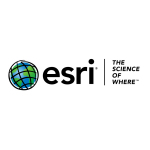Esri Commends European Union’s Open Data Directive
New Legal Requirements Enable Collaboration among EU GIS Community

Redlands, Calif., United States:
Esri, the global leader in location intelligence, today commended the European Union (EU) for its leadership in implementing Directive (EU) 2019/1024 (Open Data Directive), which aims to encourage cross-border use of reusable data in Europe. Committing to a standardized open data policy framework will make it easier for EU member states to access high-value datasets such as geospatial, earth observation, environmental, meteorological, statistical, mobility, and company ownership data in a trusted manner.
With open data, members can now use application programming interface (API) web services for access. At the unprecedented pace in which data is growing everywhere, the new model enables a European single market for open data that will benefit all members.
“We are grateful for the efforts of the European Commission for leading this directive, enabling transparent and free access to valuable geospatial data,” said Jack Dangermond, Esri founder and president. “How we access, process, and reuse data significantly influences technological development and improves our daily lives. This directive empowers European users to find solutions and enact data-driven policy to address challenges, from local to global.”
As EU members finalize implementation of the Open Data Directive, geospatial tools must support data catalog interoperability requirements for open data portals across Europe. To broaden its support for the directive, Esri is expanding the capabilities of interoperable web service APIs, metadata, and ArcGIS Hub catalogs. Using international open standards such as Data Catalog Vocabulary Application profile (DCAT-AP), European customers can share data that conforms to the new Open Data Directive and more easily expose their open data catalog and web services for reuse.
ArcGIS Hub is a system of engagement that enables businesses, citizens, communities, universities, and nongovernmental organizations (NGOs) to leverage open data and spatial analytics for collaborative policy initiatives. Current EU member state users, such as in the case of the Ireland Sustainable Development Goals (SDGs) data hub, use ArcGIS Hub to report the country’s progress toward the SDGs. The Ireland SDGs hub highlights spatial patterns, identifies trends, and shares community data to help achieve those goals.
The inclusion of DCAT-AP 2.0.1, along with an extendable architecture on ArcGIS Hub, will serve as a road map to support and guide geospatial technology users as they adopt the legal requirements of the Open Data Directive. Geospatial data is transformative, and the EU’s Open Data Directive has paved the way for greater accessibility and transparency. The changes will inspire exciting opportunities for member state collaboration and innovation across Europe.

